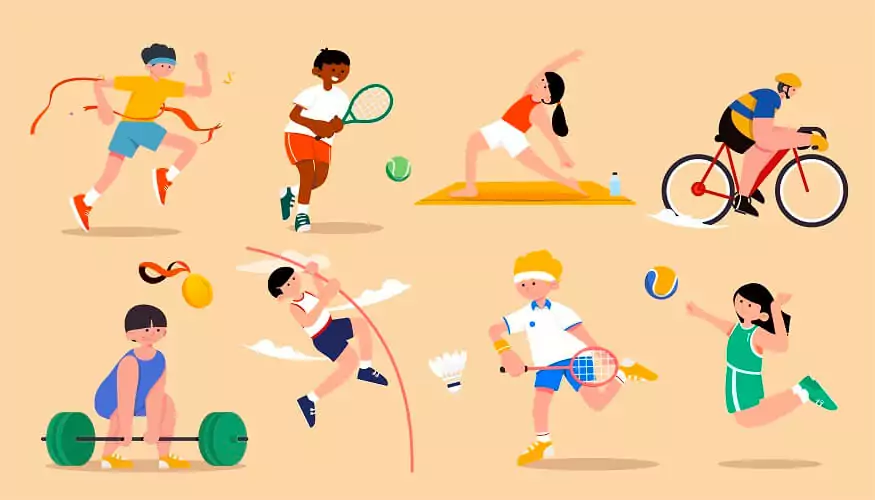Sports are an integral part of human culture and society. From the casual game in the backyard to professional competitions in stadiums, sports play a crucial role in fostering physical fitness, teamwork, and global connection. But what exactly is sport, and why does it hold such a prominent place in the world? In this article, we will explore the meaning of sports, their benefits, types of sports, and much more, while also answering frequently asked questions to give a well-rounded perspective.
Key Takeaways
- Sports encompass a wide range of activities, from individual endeavors to team-based competitions.
- Participation in sports contributes to physical health, mental well-being, and personal growth.
- Sports foster social connections, teamwork, and cultural pride.
- Engaging in sports provides an opportunity for fun, competition, and skill development.
- The positive effects of sports extend beyond the individual to society as a whole, influencing economics, politics, and social change.
What Is Sport?
Sport can be defined as any physical activity or game that involves individuals or teams competing against each other in an organized manner. These activities are typically guided by a set of rules, and the goal is usually to achieve a particular objective or score. Sports can be performed recreationally for enjoyment or as part of a professional competition for accolades and financial reward.
Sports can involve various physical and mental skills such as agility, strength, strategy, and endurance. They are typically characterized by competitive elements, but they can also serve as a means of social interaction, entertainment, and personal development.
The Origins of Sports
Sports have existed in various forms for thousands of years. The ancient Greeks are often credited with formalizing the concept of sport with the establishment of the Olympic Games in 776 BC. These games, held every four years in Olympia, became the basis for many of the organized sports that exist today. Over the centuries, various forms of sports evolved across cultures, influenced by social, technological, and political factors.
From hunting and warfare training to the organized competitions of today, sports have always held an important place in human societies. They have evolved from simple, informal activities to complex, professional endeavors that are followed by millions of people worldwide.
Why Do People Participate in Sports?
People participate in sports for various reasons, ranging from personal enjoyment and fitness to achieving social recognition or professional success. Here are some of the most common reasons why people engage in sports:
1. Physical Health and Fitness
One of the most obvious benefits of sports is the improvement of physical health. Regular participation in sports helps build strength, flexibility, and cardiovascular endurance. It also improves coordination, balance, and reflexes. For children and adults alike, sports help develop motor skills and maintain a healthy weight.
2. Mental Well-being
Sports have been shown to significantly impact mental health. Physical activity releases endorphins, which are chemicals that improve mood and reduce stress. Sports can help alleviate symptoms of anxiety and depression, providing participants with an outlet to manage their emotions and frustrations.
3. Social Interaction
Sports create opportunities for socializing and building relationships. Whether playing in a local league or supporting a professional team, sports encourage teamwork and camaraderie. This sense of belonging is important for personal growth and can lead to lifelong friendships.
4. Skill Development
Sport participation fosters the development of a variety of skills. These can range from technical skills specific to a sport to more generalized life skills like leadership, teamwork, communication, and discipline. Athletes often need to develop strong problem-solving abilities and strategic thinking, making them adaptable to different situations.
5. Entertainment and Enjoyment
For many people, sports are simply a fun way to pass the time. Watching sports events and participating in games provide entertainment and excitement. The thrill of competition, whether on the playing field or as a spectator, is a powerful draw for many.
6. Competition and Achievement
Sports offer the opportunity to compete and strive for achievement. Whether it’s winning a local game or aspiring to be a world champion, sports provide a platform for individuals to test their skills and push their limits. The sense of accomplishment that comes with success in sports can be incredibly rewarding.
7. Cultural Identity and National Pride
On a larger scale, sports play a role in cultural identity. National pride is often linked to success in international competitions like the Olympics or World Cup. Sports bring people together and can act as a powerful unifying force in times of national or international crisis.
What Are the Different Types of Sports?
There is an almost endless variety of sports, and they can be categorized in several different ways. Below are some of the major categories:
1. Individual Sports
In individual sports, athletes compete alone against other individuals or the clock. Success is based on personal performance, and results are not influenced by team dynamics. Some examples of individual sports include:
- Tennis
- Boxing
- Track and field (e.g., running, long jump)
- Swimming
- Gymnastics
2. Team Sports
Team sports involve groups of people working together to achieve a common goal, usually to outscore the opposing team. The focus is on collaboration, strategy, and teamwork. Some examples of team sports are:
- Football (Soccer)
- Basketball
- Rugby
- Volleyball
- Baseball
3. Water Sports
Water sports are those that take place on or in the water. They require specialized skills related to swimming or boating. Examples include:
- Sailing
- Surfing
- Rowing
- Water polo
- Diving
4. Winter Sports
Winter sports are typically performed in cold or snowy environments and require skills that deal with ice or snow. Examples include:
- Skiing
- Snowboarding
- Ice skating
- Ice hockey
5. Combat Sports
Combat sports involve direct physical confrontations between participants, with the goal of overcoming an opponent through skill, strength, and strategy. Some examples are:
- Karate
- Judo
- Wrestling
- MMA (Mixed Martial Arts)
6. Adventure Sports
Adventure sports often take place in natural environments and emphasize risk and excitement. These sports often involve a high degree of physical challenge and adventure. Some examples include:
- Rock climbing
- Skydiving
- Bungee jumping
- Mountain biking
How Do Sports Affect Society?
The influence of sports goes far beyond the individual participant. Sports affect society in many ways, including social, economic, and political dimensions. Here’s how:
Social Impact
Sports can serve as a tool for social change. They have historically been used as a means of promoting racial equality, gender equality, and inclusion. Iconic moments in sports history, such as Jackie Robinson breaking the color barrier in baseball or Billie Jean King’s fight for women’s equality in tennis, have had profound effects on societal attitudes.
Economic Impact
Sports contribute significantly to the global economy. Professional sports leagues generate billions of dollars in revenue from ticket sales, broadcasting rights, and sponsorship deals. Hosting major sporting events like the Olympics can provide significant economic benefits to host cities or countries, though they may also come with challenges related to costs and infrastructure.
Political Impact
Sports can also have a political dimension. International competitions, such as the Olympics or the World Cup, can become platforms for countries to showcase their national pride. At times, sports have been used as tools for diplomacy or as ways to protest political issues, such as the 1968 Olympic Black Power salute.
Conclusion
Sports play a vital role in shaping both individuals and societies. Whether as a way to stay fit, relieve stress, or engage in friendly competition, sports have universal appeal. With various types of sports available, there’s something for everyone to enjoy. They contribute significantly to social interaction, cultural identity, and global unity. The benefits of sports extend beyond physical health to include mental well-being, personal development, and fostering a sense of community. Whether you’re an athlete or a fan, the world of sports is rich in opportunities for growth, entertainment, and achievement.
FAQs
1. What is the most popular sport in the world?
Soccer (also known as football in many countries) is the most popular sport globally, with billions of fans and participants.
2. Why do people watch sports?
People watch sports for entertainment, to support their favorite teams or athletes, and to experience the thrill of competition. Sports can also bring people together, creating a sense of community and shared passion.
3. Is it necessary to play sports to stay healthy?
While playing sports is a great way to stay healthy, it is not the only way. Other forms of physical activity, such as walking, running, or going to the gym, can also contribute to good health. However, sports often make exercise more enjoyable.
4. Can sports improve mental health?
Yes, sports can have a significant positive impact on mental health by reducing stress, improving mood, and helping to manage anxiety and depression.
5. What are the benefits of playing team sports?
Playing team sports helps develop teamwork, communication, leadership skills, and the ability to work collaboratively towards a common goal. It also fosters a sense of community and belonging.
6. Can anyone participate in sports?
Yes, sports can be enjoyed by people of all ages and skill levels. There are recreational leagues and programs for beginners and people with various abilities, and many sports can be adapted to suit different needs.
7. How can sports help build leadership skills?
Sports often require individuals to take on leadership roles, whether as a captain, organizer, or motivator. Leading a team in sports helps develop decision-making, communication, and responsibility—skills that are transferable to other areas of life.



